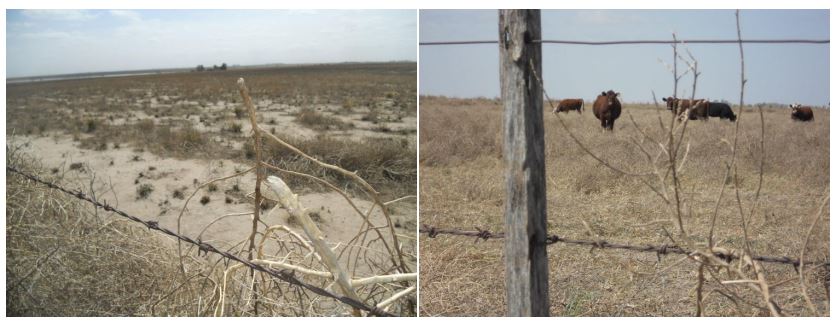The southwest of the Buenos Aires Province is a cattle rearing zone. The soils in Argentina’s semi-arid Pampa regions are especially vulnerable to increasing climate variability and change. Over the last century, Argentina has experienced significant agricultural intensification without much attention being given to environmental sustainability and the conservation of agroecosystems, natural resilience and adaptive capacity of the agricultural systems, which have therefore suffered significant damage and loss of their natural climate resilience.
The project objective is to contribute to reduce climate and human induced vulnerability of the agroecosystems in the Southwest of the Buenos Aires Province by increasing adaptive capacity of key local institutions and actors, and piloting climate resilient and sustainable land management practices. Participatory planning processes will be used to identify and pilot concrete adaptation measures focusing on water, crops and livestock management to promote climate resilience.
Learn more
- World Bank article (December 4, 2018): Riding the Climate Storm in Patagones, Argentina
- World Bank article (January 26, 2018): Agricultores luchan contra la desertificación transformando los ecosistemas productivos
- Project videos
- World Bank project page
| Project Component 1: Reducing Institutional and Community-level Vulnerability | USD 729,399 |
| Project Component 2: Implementing Adaptation Measures in Productive Agroecosystems | USD 2,400,000 |
| Project Component 3: Applying Participatory Approach to Knowledge Management and Local Capacity – Development for Adaptation to Climate Change | USD 281,698 |
| Project Component 4: Developing a Sustainability Strategy | USD 206,503 |
| Project execution cost | USD 342,600 |
| Total Project Cost | USD 3,960,200 |
| Implementing Entity Project Cycle Management Fee | USD 336,617 |
| Grant Amount | USD 4,296,817 |
Project Documents
| Attachment | Type | Size |
|---|---|---|
| Project document | DOCX | 7 MB |
| Inception Report | 432 KB | |
| Mid-term evaluation report | 542 KB | |
| Project completion report | 303 KB | |
| Final evaluation report | 2 MB | |
| PPR1 (for web) | XLSX | 169 KB |
| PPR2 (for web) | XLSX | 208 KB |
| PPR3 (for web) | XLSX | 270 KB |
| Other project order | 364 KB | |
| Other project order | 2 MB |


